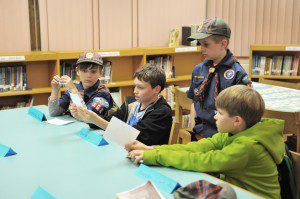
Westfield Cub Scout Pack 108 members Mike Collins, second from left, reads a Westfield city budget item during a mock city council meeting with, left-right, Aidan Thomas, Billy Fouche and Cameron Klee during a scouting exercise at the Paper Mill Elementary School yesterday. The scouts were participating in a mock city budget exercise to help earn their Citizenship Badge. The class was spearheaded by scout leader and city councilor Dave Flaherty. (Photo by Frederick Gore)
WESTFIELD – Bill and Jacky Fouche’s 4th grade Webelos Cub Scouts from pack 108 at Papermill School got their chance to balance the city budget during their den meeting on Tuesday.
City Councilor Dave Flaherty was a guest speaker. Cub Scouts and Boy Scouts regularly meet with local elected officials to learn about citizenship and government. Typically the conversations are about rights and responsibilities as citizens, and about the specific jobs of various government officials.
This time, Flaherty decided to give them all a chance to act as city councilors. After a brief Q&A session, Flaherty congratulated the scouts on being recently elected to serve as city councilors (they all won by healthy margins). They each got their own name plate and a role-playing card that described a specific concern or position on a budget item: “The schools need new roofs”; “Your grandmother can barely afford to pay her taxes, she wants you to slow spending and reduce taxes”; “You have to defend the piggy bank, don’t let it get below $6 million – it’s needed in case we have emergencies such as natural disasters”; “Your brother is a policeman who is considering moving to another town to earn more money”; “The schools need to spend more money on foreign languages” ; “You’ve received hundreds of complaints about the roads”; etc…
Flaherty told them their first job was to balance the city budget before heading into next week’s tax setting session. They were given $117 million in play money and shown where it all came from: property taxes, excise taxes, state aid, fees, and other miscellaneous revenue. Then they learned about all of the mandated expenses and fixed costs, debt payments, insurance and benefits, and general government overhead. They were left with a pile of money to spend on schools, police, fire, and public works. Any money left over could be added to their piggy bank or given back to the taxpayers.
The new councilors took their first shot at distributing the money. They had tens of millions of dollars left over that headed back to the piggy bank. Then the parents got involved. They were given role-playing cards to act as concerned citizens who showed up at a city council meetings before the final vote on the budget. Their concerns or complaints were things like: “Our taxes are too high”; “My roads need to be paved”; “I think the schools should be better and should offer more foreign languages, music, and art”; “Senior citizens deserve that senior center”; “As a business owner, my taxes are almost double the homeowner rate, I have to raise all my prices just to pay my taxes”; “I’m the Fire Chief and we desperately need a new fire truck”; etc.
The councilors listened to these concerns, re-read their role playing cards, and then redistributed a lot of money using the motion and voting concepts used by the regular city council. Councilor Matt came up with a great motion to move money between three different departments. Councilor Billy protected the piggy bank. After discussion, they ending up allocating almost all of the money this time – leaving only $2 million unspent. The majority voted to approve the budget – even though everyone didn’t get everything they wanted.
Flaherty and the scouts discussed the process and importance of listening to concerns, weighing options, the differences between one-time and recurring expenses, and the challenge of taking money from one department to give to another in order to have a balanced budget. Finally, Councilor Flaherty told them the real Westfield numbers for schools, police, fire, and public works. The scouts were surprised to see some of the numbers. In their model the scouts more than doubled the budgets for police and fire, tripled the budget for public works, and shorted the budget for schools.
“This was a great exercise for the kids. They got to see what it’s really like to be a city councilor who has to listen to all of the concerns and then make votes about spending taxpayer money”, said Flaherty. “I was thrilled to see that they were ‘thrifty’ (as Boy Scouts should be). Even after listening to all the concerns, and going through a few rounds of budget edits, they still managed to save a little money”.
The scouts really impressed Flaherty.
“I think we’ve got some good candidates in the pipeline,” he said. “Anyone considering a run for city council in 2023 is going to have quite a challenge.”

